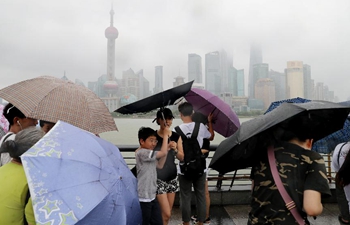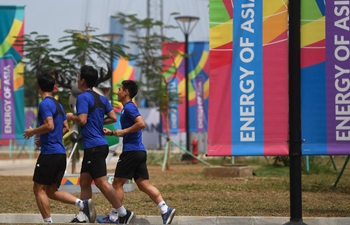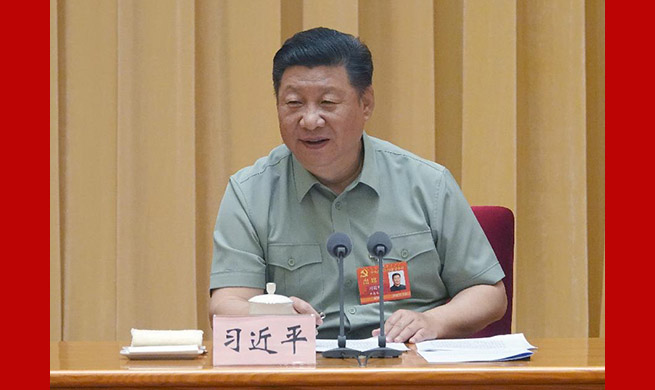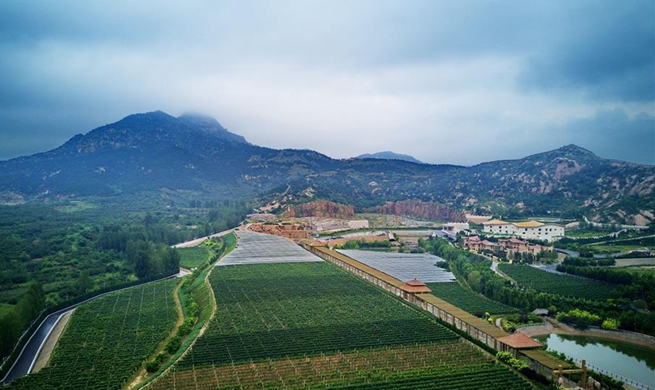by Mahmoud Fouly
CAIRO, Aug. 19 (Xinhua) -- Yemen has become a theater for conflicting regional interests and ambitions that led to a devastating civil war whose settlement is in the hands of concerned regional parties rather than the Yemenis themselves, said Yemeni and Egyptian experts.
Yemen has been engaged in an internal fighting since the Iran-backed Shiite Houthi rebels, who helped overthrow internationally-recognized President Abd-Rabbu Mansour Hadi, seized most of the Yemeni northern provinces in September 2014 including the capital Sanaa.
Meanwhile, the pro-Hadi forces supported by a Saudi-led Arab military alliance controlled the rest of Yemen, including the southern major city of Aden.
Since March 2015, the military coalition led by Saudi Arabia has been launching airstrikes against the Houthis in Yemen in support of Hadi.
More than 10,000 Yemenis, mostly civilians, have been killed in the war and more than three million others displaced, according to UN reports.
REGIONAL INFLUENCE
The conflict in Yemen between the Houthis and the internationally-recognized government represents a larger conflict between the regional backers of both sides, namely Iran and Saudi Arabia, the two major rivals in the Middle East region.
"The crisis is complicated, for it includes massive regional interventions. Iran interferes from one side and Saudi Arabia from the other. Thus, it has become not just a Yemeni crisis but a regional one," said Wedad al-Badawi, a Yemeni journalist and activist.
Despite its massive anti-Houthi air raids for more than three years, the Saudi-led coalition could not resolve the situation in Yemen.
The Yemeni government officially complained to the United Nations Security Council in July about the presence of Lebanon's Shiite Hezbollah militant group, Iran's key regional ally, in Yemen, claiming that the group provides the Houthi fighters with military training and planning.
"These regional parties talk about the Yemeni issue as if it's their own affair, whereas none of them is concerned about the sufferings of the Yemeni people who face poverty, famine, cholera and other fatal epidemics due to the ongoing war," Badawi told Xinhua.
She noted the growth of "war economy" in the conflict-stricken country where the Houthis buy large properties, make arms deals and control taxes and humanitarian aids to expand their financial and economic influence in the northern parts in general and in the capital Sanaa in particular.
"The legitimate forces and the pro-legitimacy coalition couldn't limit the Houthis' economic influence that expands to currently control Hodeidah Red Sea port in the west that provides them with huge resources," she lamented.
Although not directly involved, the United States remains in the background of the Yemeni picture, for U.S. President Donald Trump, who withdrew from a Western-Iranian nuclear deal and restored sanctions on Iran, supports Washington's major regional ally Saudi Arabia in its military campaign against the Iran-backed Houthis in Yemen.
RED SEA SECURITY
Bordering the Red Sea from the west, the Gulf of Aden from the south and Bab al-Mandeb Strait in between, war-torn Yemen has a strategic significance for the national security of the states sharing the Red Sea and the security of trade and navigation there.
Egypt, one of the Red Sea partners and a main Saudi ally, provides logistic support for the Saudi-led coalition to restore the legitimate government in Yemen but it is not directly involved in the coalition's military actions.
Egypt has repeatedly rejected Iran's regional expansion and intervention in Arab conflicts including those of Syria and Yemen and condemned the Houthis' occasional launch of ballistic missiles against Saudi territories.
"We will not allow Yemen to become a vehicle for the influence of non-Arab forces, or a platform on which to threaten the security and stability of Arab nations or the freedom of navigation in the Red Sea and Bab al-Mandeb," Egyptian President Abdel-Fattah al-Sisi said last week in a joint press conference with his Yemeni counterpart Hadi in the Egyptian capital Cairo.
The Egyptian president also underscored the vital importance of Yemen's security and stability not just for Egypt's national security but for the security and stability of the whole region, reiterating his country's support for Hadi's government.
Ahmed Eleiba, a political researcher and a writer at Egyptian state-run Al-Ahram newspaper, stressed that Egypt is an integral part of the security of the Red Sea navigation although it is not the only player.
"Egypt's recent joint naval military exercise with the United States, Saudi Arabia and the United Arab Emirates in the Red Sea, dubbed 'Eagle Response 2018,' has strategic significance as it involved training on removing naval mines like those Iran threatens to use in response to U.S. sanctions," the researcher told Xinhua.
SOLUTION OVERSEAS
The Yemeni various factions suffer a state of domestic division and growing sectarianism that doesn't see a settlement in the near future, yet hope is still there.
Most experts believe that the solution for the Yemeni crisis is no longer in the hands of the Yemenis alone but has to be initiated by involving regional and international parties.
In early July, UN Special Envoy to Yemen Martin Griffiths visited Riyadh as a key player in possible future settlement, and he met later in the same month with Houthi leaders to convince them of withdrawing from Hodeidah port as part of a UN-sponsored peace plan.
"The crisis is complicated and I don't see a near settlement except through international efforts, such as a breakthrough in the U.S.-Iranian conflict over the nuclear issue and UN-backed peace initiatives like that of Al-Hodeidah," said Eleiba.
He explained that the United States could influence Saudi Arabia's position and Iran could affect that of the Houthis.
For her part, Badawi agreed that there has to be a quick "regional-oriented settlement with international guarantees" as the only hope to put an end to the Yemeni crisis.
"The procedures for building trust among the Yemenis should start from now through international players, the UN special envoy, the concerned Gulf countries and the ambassadors of peace-sponsoring states," the Yemeni journalist told Xinhua.

















